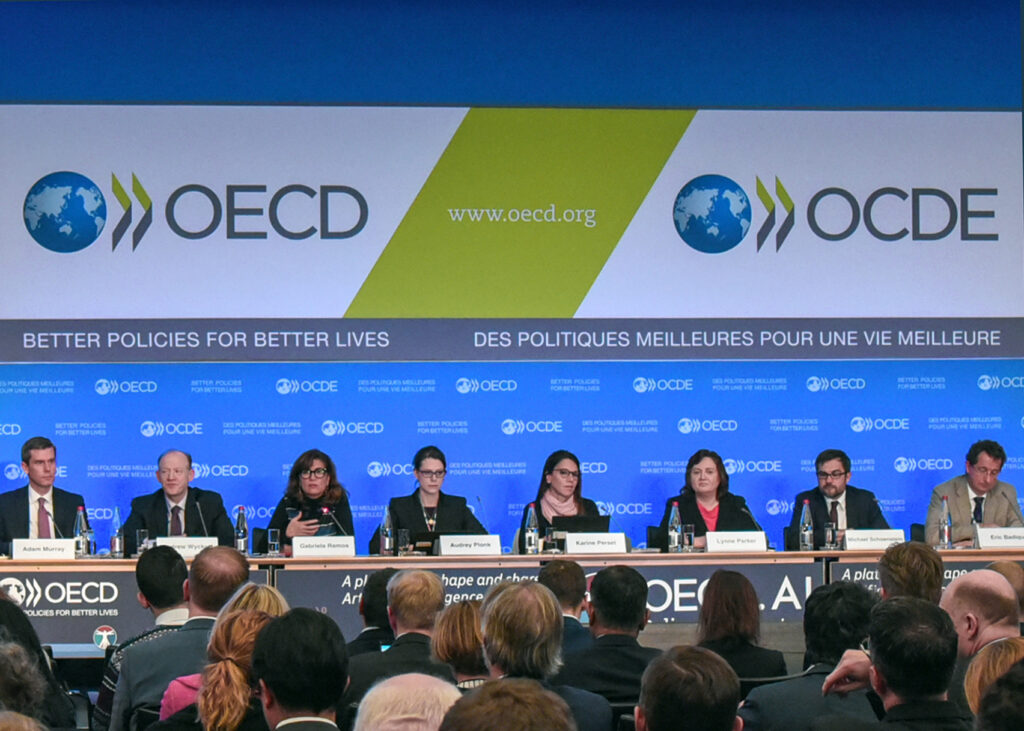
The OECD AI Policy Observatory (OECD.AI) is the primary vector for GPAI and OECD governments and countries worldwide to put the OECD AI Principles into practice.
In May 2019, OECD countries adopted the Recommendation on Artificial Intelligence, the OECD AI Principles, the first intergovernmental standard on AI. The OECD AI Principles provided the basis for the G20 AI Principles endorsed by Leaders in June 2019. Since then, a range of countries worldwide has adhered to the Principles.
In July 2024, the OECD and the Global Partnership on Artificial Intelligence (GPAI) joined forces to advance an ambitious agenda for implementing human-centric, safe, secure and trustworthy AI embodied in the OECD AI Principles.
This renewed vision for GPAI, announced at the New Delhi Summit convened on 3-4 July 2024 by GPAI Chair India, combines the respective expertise and capabilities of the GPAI and OECD to expand their collective reach.
This new integrated partnership brings together OECD Members, Argentina, Brazil, India, Serbia, Senegal and Singapore – 44 jurisdictions in total, across six continents.
The OECD’s proven record for evidence-based decision-making
For over 60 years, the OECD has formulated policy recommendations based on evidence-based decisions, robust data and analysis. As part of this, OECD.AI is a unique source for research, data and visualisations of AI trends and developments. It features a database of AI policies from almost 70 countries, a unique resource for governments to compare AI policy responses and share good practices.
The OECD connects policy silos
The OECD provides expertise and guidance upstream of the policy development cycle – often in the form of common frameworks and principles. OECD initiatives bring together different policy communities to tackle multidisciplinary topics, such as AI and corporate governance or AI and energy systems.
- 2016: OECD AI Foresight Forum
- 2017: OECD Conference AI: Intelligent Machines, Smart Policies
- 2018 –Feb. 2019: AI expert group at the OECD (AIGO) scopes principles to foster trust in and adoption of AI
2019
- May 2019: adoption of OECD AI Principles
- June 2019: G20 AI Principles, drawn from OECD AI Principles
- June 2019: publication of “Artificial Intelligence in Society” book
- 2019: creation of OECD Global Parliamentary Network on AI (GPN AI)
2020
- 2020: start of the OECD Programme on Work, Innovation, Productivity and Skills (AI-WIPS), led and supported by Germany
- 2020: launch of the OECD Network of Experts on AI (ONE AI) and the OECD AI Policy Observatory (OECD.AI)
- June 2020: launch of the Global Partnership on Artificial Intelligence (GPAI), hosted at the OECD
2021
- June 2021: launch of State of Implementation of the OECD AI Principles: Insights from National AI Policies
- June 2021: launch of Tools for Trustworthy AI, a framework to compare implementation tools for trustworthy AI systems.
- October 2021: report about progress so far on putting the OECD AI Principles into practice at the OECD Ministerial Council Meeting
2022
- February 2022: second annual International Conference on AI in Work, Innovation, Productivity and Skills
- February 2022: launch of the OECD Framework or the Classification of AI Systems
- March 2022: creation of the first official Working Party on AI Governance (AIGO) at the OECD
2024
- GPAI and the OECD join together to work on artificial intelligence, announced at the New Delhi Summit convened on 3-4 July 2024 by GPAI Chair India, of which a key output was the New Dehli Declaration.

























